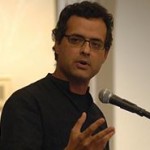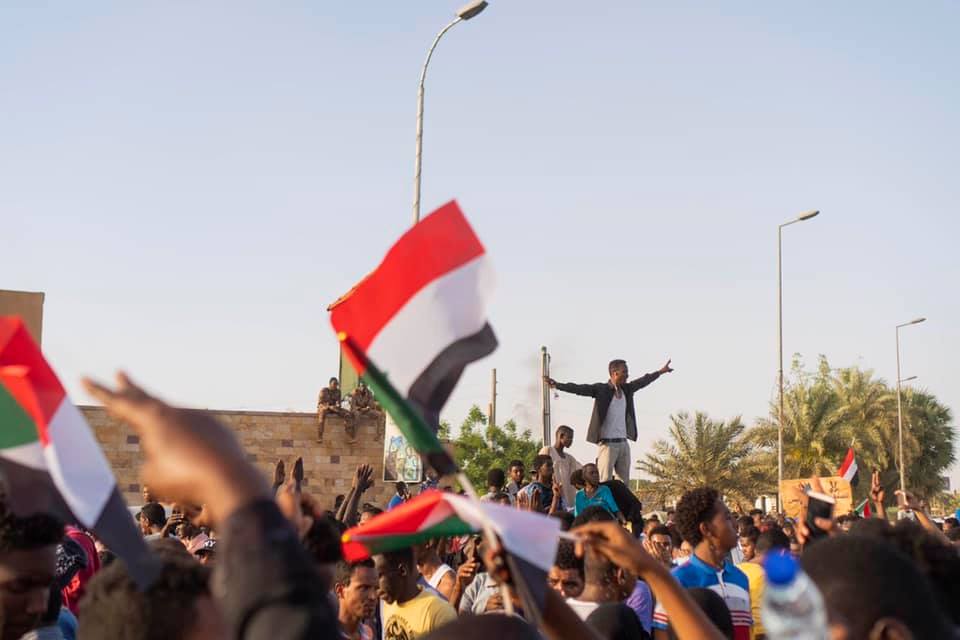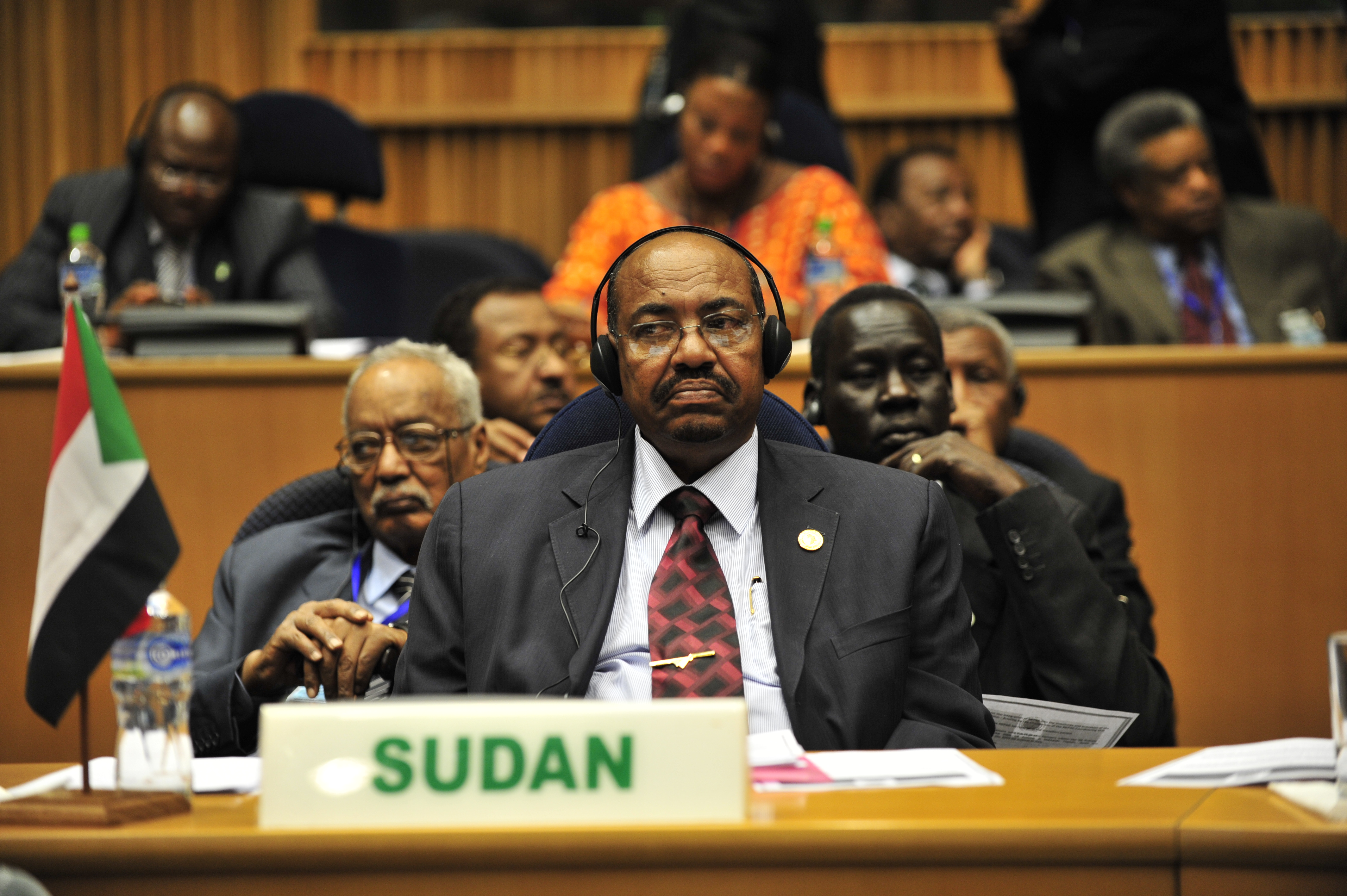Vijay Prashad looks at deep-seated, overlooked uprisings in Kashmir and Sudan.

Uzma Nawchoo, ‘When we were small, things were really simple; they just used kaend-taar (barbed wire) to create a cage. Now when we are adults, we are caged in something avant-garde called razor wire.” 2019.
Tricontinental: Institute for Social Research
 More than 7 million Kashmiris remain suffocated by the Indian government. The curfew that went into effect Aug. 5 is still in place. The media is not able to get into the state and offer a report of the situation. Telephone and internet services have been shut down. Over 2000 academics, journalists and politicians are in prison or under house arrest. Most recently, the Indian government arrested Farooq Abdullah (age 82) under the Public Safety Act of 1978 (which Amnesty International calls a “lawless law”). Abdullah’s father – Sheikh Abdullah – was the unchallenged leader of Kashmir’s liberation movement in the 1940s.
More than 7 million Kashmiris remain suffocated by the Indian government. The curfew that went into effect Aug. 5 is still in place. The media is not able to get into the state and offer a report of the situation. Telephone and internet services have been shut down. Over 2000 academics, journalists and politicians are in prison or under house arrest. Most recently, the Indian government arrested Farooq Abdullah (age 82) under the Public Safety Act of 1978 (which Amnesty International calls a “lawless law”). Abdullah’s father – Sheikh Abdullah – was the unchallenged leader of Kashmir’s liberation movement in the 1940s.

Mohammed Yusuf Tarigami. (YouTube)
Despite the production of a state of fear, brave people have come out on the streets to protest. A senior government official said that there have been at least 722 protests since Aug. 5. This is a testament to the steadfast determination of the Kashmiri people to prevent their elimination. But their protests and their words are not being amplified. It is as if Kashmir has vanished from the map.
Among the brave Kashmiris is Mohammed Yusuf Tarigami, the leader of the communist movement in the state. Tarigami, who comes from a small village in southern Kashmir, has spent the past 50 years fighting for Kashmir, dreaming of a Kashmir free of war and poverty. He won a seat in the Jammu and Kashmir Legislative Assembly four times (1996, 2002, 2008 and 2014), an assembly which the right-wing government in New Delhi suspended. Prisons are as familiar to him as that Assembly. There is “accumulated anger” inside Kashmir, he says, anger that has no easy political outlet.
Protests in Sudan
On Sept. 12, thousands of people took to the streets across Sudan to call for the ouster of the chief justice and the attorney general. The Sudanese Professionals Association – and the Sudanese Communist Party – have said that they are unhappy that the reins of power are with people like Gen. Abdel Fattah al-Burhan and Gen. Mohammed Hamdan Dagalo. They want to see a more civilian character to the government.
On Dec. 19, 2018, an uprising began in Sudan that culminated in the removal of Sudan’s president – Omar al-Bashir – from power on April 11. The army staged a conservative military coup to abort the revolutionary tide and keep the same old policies. It dissolved parliament and established a two-year military regime led by the Transitional Military Council. The revolutionary forces – galvanized into the Alliance of Freedom and Change, with the Sudanese Communist Party and the Sudanese Professionals Association at the front – continued their march forward, determined to make a full revolution. The clash between the Transitional Military Council and the Alliance of Freedom and Change continues. It could either result in an Egypt-like solution, where the military regime masquerades as a democratic party, or it could move forward with a revolutionary democracy.

Sudanese protestors near the army HQ in Khartoum, April 2019. (M.Saleh, CC BY-SA 4.0 via Wikimedia Commons)
Why Did the Sudanese People Rise?
In 2018, the range of negative social pressures rose as a result of the stagnation of Sudan’s economy. The growth rate fell to minus-2.3 percent that year. This was caused by at least four things:
No. 1 Wars. Omar al-Bashir had been in power since 1989. He oversaw two deadly wars in this period. The first was between the north and south of the country. Its second phase lasted from 1983 to 2005. This war resulted in the death of 2 million people, the displacement of 4 million people, and the partition of the country into Sudan and South Sudan in 2011. The second war was in the province of Darfur, which resulted in the death of millions and the destruction of that vast, marginalized region that has been deeply impacted by the desiccation of the Sahara Desert. Both conflicts weakened Sudan.
No. 2 Oil. Sudan’s economy is dependent on oil exports, with most of the oil in the southern part of the country. With the partition of Sudan, the country of Sudan lost 75 percent of its oil reserves to South Sudan. Nonetheless, in 2008, 21.5 percent of Sudan’s GDP came from oil exports (and drove a growth rate of 11.5 percent). When global oil prices collapsed in 2014, Sudan’s economy went into rapid decline.
No. 3 IMF. By 2017, Sudan had an external debt of over $50 billion – 61 percent of its GDP – with about 84 percent of it in arrears. Sudan owed 89 percent of this debt to countries and to commercial banks (the rest to international financial institutions). In November 2017, the IMF recommended that Sudan’s government cut bread and fuel subsidies and devalue its currency, the Sudanese pound. The government followed the IMF advice. Already, 50 percent of the Sudanese population lived in poverty. The situation went out of control after the subsidy cuts and the devaluation.
No. 4 Political Islam. Since 1976 Sudan has drifted into the worldview of political Islam. The U.S.-backed dictator Jaafar al-Nimeiri allied himself with the Muslim Brotherhood that year. A mass uprising erupted in April 1985, resulting in the overthrow of the al-Nimeiri regime and opening the way for the restoration of a democratic process. Attempts were made between 1985-89 to reach a peaceful solution to the civil war in the South and to abolish the Sharia law that was introduced by al-Nimeiri and the Muslim Brotherhood alliance. However, the democratic process was short-lived. In June 1989 the Muslim Brotherhood staged a coup, toppled the democratically elected government, and dissolved parliament, political parties, trade unions and all civil society organizations. It imposed the most reactionary regime resulting in the continuation of the war in the South, the dismissal of over 250,000 workers and civil servants from work, and the establishment of “ghost houses” where leaders of the democratic forces were tortured (and some killed). Omar al-Bashir, who inherited this regime, continued the Muslim Brotherhood agenda. Rather than tackle the serious political, economic, and social problems in Sudan, the governments of al-Nimeiri and al-Bashir hid behind a harsh cultural agenda (which included blasphemy laws, laws against women’s rights, and policies against the diversity of Sudan’s peoples and culture). Both al-Nimeiri and al-Bashir fell because they had no answer to economic crises; their only response was repression against IMF riots.

Sudan’s Omar al-Bashir during development conference Addis Ababa, Ethiopia, Jan. 31, 2009.
(U.S. Navy/Jesse B. Awalt, Wikimedia Commons)
How Did the Sudanese People Rise?
The uprising began in Atbara, a workers’ city which had witnessed the birth of the Sudanese trade union movement in the 1940s. The residue of that struggle, and of the victorious fight to overthrow the British-backed dictator Ibrahim Abboud (in October 1964) and al-Nimeiri (April 1985), remains.
A range of older political formations (the Sudanese Communist Party and the Sudanese Women’s Union) and newer formations (the Sudanese Professionals Association, formed in 2016 by 17 trade unions) joined in this current struggle with civil society groups and political parties alongside a new group whose name defines the temperature, Girifna – “We Are Disgusted.” These groups gathered around a Declaration of Freedom and Change, which called for full democracy over the politics and the economics of the country; a commitment to health, education, housing and the protection of the environment; and the immediate formation of a National Committee for the Constitution. This declaration binds the various political actors into a tight unity.
What Is Possible in Sudan?
For the moment, the military seems to have the upper hand. Faced with the determination and heroic continuation of the mass protest movement under the leadership of the Freedom and Change Alliance, and the support of junior officers, the military junta accepted the compromise proposals of the African Union to share power with the alliance for the coming three years. The military is not prepared to fully crush the movement because many junior, non-commissioned officers are sympathetic to its goals. This does not mean that the military – like al-Bashir before it – has not used violence. It has. But the alliance, rooted in the Declaration, has been resilient. For them, the revolutionary process has not ended.
That sense of a process without end comes from Sudan, but it also defines the situation in Kashmir as well as Tunisia. In 1971, the military dictatorship in Sudan brought the leader of the Sudanese Communist Party – Abdel Khaliq Mahjub – before a tribunal. He was sentenced to death and executed. Mohammed el-Fayturi (1929-2015), one of Sudan’s most wondrous poets, wrote the exquisite “Dig No Grave for Me” in honour of Mahjub.
I shall lie in every inch of the earth.
I shall live like water on the Nile’s body;
Like the sun over my homeland’s fields.
….
I know why tyrants believe their guns.
I am not afraid –
My voice is the gallows for all tyrants.
One of Mahjoub’s close comrades was Fatima Ahmed Ibrahim, whose husband al-Shafie Ahmed al-Sheikh was executed alongside Mahjoub in 1971. In 1965 Fatima was the first woman to enter Sudan’s parliament. She took her seat as a member of the Sudanese Communist Party. She was already a member of the Party’s politburo and the president of the Sudanese Women’s Union. It was women like Fatima Ahmed Ibrahim, and men like Mohammed Yusuf Tarigami who build the road that we must continue to build towards the future. Build roads, they say, not graves. That is our outlook.
Vijay Prashad, an Indian historian, journalist and commentator, is the executive director of Tricontinental: Institute for Social Research and the chief editor of Left Word Books.
This article is from Tricontinental: Institute for Social Research.
Before commenting please read Robert Parry’s Comment Policy. Allegations unsupported by facts, gross or misleading factual errors and ad hominem attacks, and abusive language toward other commenters or our writers will be removed. If your comment does not immediately appear, please be patient as it is manually reviewed.

Shows how hard it is for people to control their own fate when things have to be put in terms of growth and IMF loans and the price of oil when the people who live in a place have no power and many are starving and under the control of well armed militia.. To make a hero of a dead poet over some words in translation in a snapshot of a decades old problem is an oversimplification. The USA in particular and Neo-colonialism in general are strong influences in the Sudan problem, China was also involved and people did not matter as much as the oil in South Sudan. Very sad, very horrible, many dead of starvation. There are other trouble spots like Kashmir which We the People are not well informed about. Good article just to talk of these hot spots.
In 2009, after the International Criminal Court issued an arrest warrant for Sudanese president al-Bashir on charges of war crimes and crimes against humanity for killing a quarter of a million black Africans in Darfur, Iran, Hwezbollah and the Palestinian militant group Hamas showed their support for him by sending top officials to the Sudanese capital and denouncing the international warrant for his arrest on charges of war crimes in Darfur.
Source: NBC Newes
Iran, Hamas send envoys to back Sudan leader
3/6/2009
@ “… Public Safety Act of 1978 (which Amnesty International calls a “lawless law”) …”
I just read it.
Wow! The people who wrote or voted for that Act’s passage should be confined for life to a mental institution. I’ve never before read such repressive legislation.
I am a bit confused now. This article from The Caravan presents a rather dubious portrait of Tarigami and one gets the sense he has been more of an opportunist than anything else. What to believe? (see Caravan Magazine, September 22, 2019)
Thank you, Vijay, for exposing what the powers that be want to bury. Unextinguishable struggle for humanity.
Great to get Prashad’s perspective on events in Sudan here at CN. The only free-to-air news channel in my country is Al-Jazeera English, and the positive coverage the movement garnered on “Muslim Brotherhood TV” did not fill me with confidence. It’s heartening see the Sudanese Communist Party playing a leading role, the question is whether it is still the party whose militant was so eloquently eulogised above, or has it degenerated like so many or its counterparts throughout the world? Remember that the mighty PCI of Bordiga and Gramsci devolved into the pathetic PD who is about to enter government to make Italy safe again for neoliberalism and the ‘European idea’.
Does the party harbour illusions about the West and its support for “democracy”? Or does it remember that the Imperialist powers and their local flunkies have no need for such a thing, and that the only force that has consistently fought for democracy in the former 3rd World is the exploited classes themselves? Prashad characterises the Sudanese Professionals Association as a Trade Union body, but its name suggests that it may comprise those social layers who hold the most illusions about the “Democratic West”. It will take some intense ideological work to help dispell these illusions, as it may be too late for the movement by the time the Imperialists have dispelled them in the most brutal manner.
The party could also seek to leverage any connections it may have to the Chinese CP and the Russian CPs, who have connections to the political and military institutions of their countries. Both Russia and China seem to have taken a lukewarm approach to the movement due to the risk of Western subversion or the triumph of whatever dog the Muslim Brotherhood has in this fight (the Brotherhood having fallen out with Bashir many years before his fall). The kind of radical transformation required to end IMF-imposed Austerity and rampant underdevelopment cannot be carried out under the wing of the West, and the current prestige enjoyed by the Russian and Chinese militaries vis-a-vis the West may be invaluable in rallying the crucial junior officer cadre of the army to the side of Revolution.